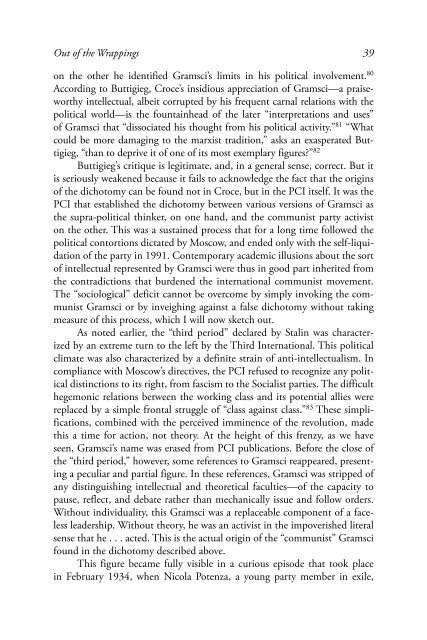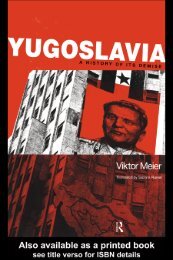Gramsci and Trotsky in the Shadow of Stalinism: The ... - Indymedia
Gramsci and Trotsky in the Shadow of Stalinism: The ... - Indymedia
Gramsci and Trotsky in the Shadow of Stalinism: The ... - Indymedia
- No tags were found...
You also want an ePaper? Increase the reach of your titles
YUMPU automatically turns print PDFs into web optimized ePapers that Google loves.
Out <strong>of</strong> <strong>the</strong> Wrapp<strong>in</strong>gs 39on <strong>the</strong> o<strong>the</strong>r he identified <strong>Gramsci</strong>’s limits <strong>in</strong> his political <strong>in</strong>volvement. 80Accord<strong>in</strong>g to Buttigieg, Croce’s <strong>in</strong>sidious appreciation <strong>of</strong> <strong>Gramsci</strong>—a praiseworthy<strong>in</strong>tellectual, albeit corrupted by his frequent carnal relations with <strong>the</strong>political world—is <strong>the</strong> founta<strong>in</strong>head <strong>of</strong> <strong>the</strong> later “<strong>in</strong>terpretations <strong>and</strong> uses”<strong>of</strong> <strong>Gramsci</strong> that “dissociated his thought from his political activity.” 81 “Whatcould be more damag<strong>in</strong>g to <strong>the</strong> marxist tradition,” asks an exasperated Buttigieg,“than to deprive it <strong>of</strong> one <strong>of</strong> its most exemplary figures?” 82Buttigieg’s critique is legitimate, <strong>and</strong>, <strong>in</strong> a general sense, correct. But itis seriously weakened because it fails to acknowledge <strong>the</strong> fact that <strong>the</strong> orig<strong>in</strong>s<strong>of</strong> <strong>the</strong> dichotomy can be found not <strong>in</strong> Croce, but <strong>in</strong> <strong>the</strong> PCI itself. It was <strong>the</strong>PCI that established <strong>the</strong> dichotomy between various versions <strong>of</strong> <strong>Gramsci</strong> as<strong>the</strong> supra-political th<strong>in</strong>ker, on one h<strong>and</strong>, <strong>and</strong> <strong>the</strong> communist party activiston <strong>the</strong> o<strong>the</strong>r. This was a susta<strong>in</strong>ed process that for a long time followed <strong>the</strong>political contortions dictated by Moscow, <strong>and</strong> ended only with <strong>the</strong> self-liquidation<strong>of</strong> <strong>the</strong> party <strong>in</strong> 1991. Contemporary academic illusions about <strong>the</strong> sort<strong>of</strong> <strong>in</strong>tellectual represented by <strong>Gramsci</strong> were thus <strong>in</strong> good part <strong>in</strong>herited from<strong>the</strong> contradictions that burdened <strong>the</strong> <strong>in</strong>ternational communist movement.<strong>The</strong> “sociological” deficit cannot be overcome by simply <strong>in</strong>vok<strong>in</strong>g <strong>the</strong> communist<strong>Gramsci</strong> or by <strong>in</strong>veigh<strong>in</strong>g aga<strong>in</strong>st a false dichotomy without tak<strong>in</strong>gmeasure <strong>of</strong> this process, which I will now sketch out.As noted earlier, <strong>the</strong> “third period” declared by Stal<strong>in</strong> was characterizedby an extreme turn to <strong>the</strong> left by <strong>the</strong> Third International. This politicalclimate was also characterized by a def<strong>in</strong>ite stra<strong>in</strong> <strong>of</strong> anti-<strong>in</strong>tellectualism. Incompliance with Moscow’s directives, <strong>the</strong> PCI refused to recognize any politicaldist<strong>in</strong>ctions to its right, from fascism to <strong>the</strong> Socialist parties. <strong>The</strong> difficul<strong>the</strong>gemonic relations between <strong>the</strong> work<strong>in</strong>g class <strong>and</strong> its potential allies werereplaced by a simple frontal struggle <strong>of</strong> “class aga<strong>in</strong>st class.” 83 <strong>The</strong>se simplifications,comb<strong>in</strong>ed with <strong>the</strong> perceived imm<strong>in</strong>ence <strong>of</strong> <strong>the</strong> revolution, madethis a time for action, not <strong>the</strong>ory. At <strong>the</strong> height <strong>of</strong> this frenzy, as we haveseen, <strong>Gramsci</strong>’s name was erased from PCI publications. Before <strong>the</strong> close <strong>of</strong><strong>the</strong> “third period,” however, some references to <strong>Gramsci</strong> reappeared, present<strong>in</strong>ga peculiar <strong>and</strong> partial figure. In <strong>the</strong>se references, <strong>Gramsci</strong> was stripped <strong>of</strong>any dist<strong>in</strong>guish<strong>in</strong>g <strong>in</strong>tellectual <strong>and</strong> <strong>the</strong>oretical faculties—<strong>of</strong> <strong>the</strong> capacity topause, reflect, <strong>and</strong> debate ra<strong>the</strong>r than mechanically issue <strong>and</strong> follow orders.Without <strong>in</strong>dividuality, this <strong>Gramsci</strong> was a replaceable component <strong>of</strong> a facelessleadership. Without <strong>the</strong>ory, he was an activist <strong>in</strong> <strong>the</strong> impoverished literalsense that he . . . acted. This is <strong>the</strong> actual orig<strong>in</strong> <strong>of</strong> <strong>the</strong> “communist” <strong>Gramsci</strong>found <strong>in</strong> <strong>the</strong> dichotomy described above.This figure became fully visible <strong>in</strong> a curious episode that took place<strong>in</strong> February 1934, when Nicola Potenza, a young party member <strong>in</strong> exile,
















